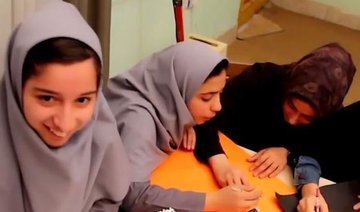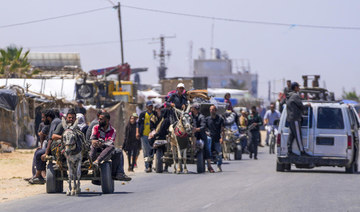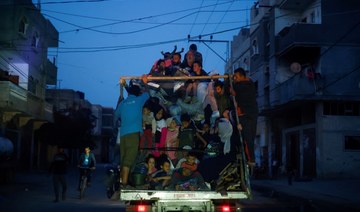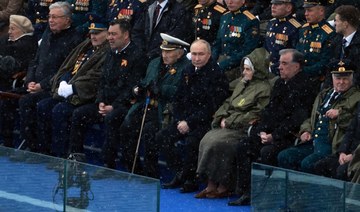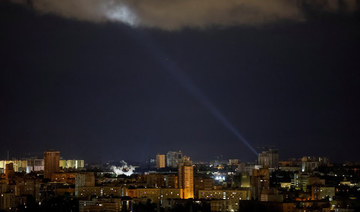AFGHANISTAN: A team of Afghan girls who had been denied visas to attend a Washington robotics competition spoke of Donald Trump’s support Thursday after US authorities changed course and allowed them to come.
Clutching Afghan flags and waving to photographers, the schoolgirls boarded a plane in Herat in western Afghanistan Thursday afternoon to begin the long journey to Washington, where they will become the first robotics team to represent the war-torn country overseas.
US authorities had originally refused access to schoolchildren from a number of Muslim-majority nations to participate in the science contest, decisions that followed implementation of stricter visa policies under Trump.
But the US president urged a reversal following public outcry over the Afghan girls’ inability to attend the event, according to US media, with the decision announced Wednesday.
“The President of the United States and the people of America supported us in this case, which shows that they have not forgotten us,” one competitor, Yasamin Yasinzadah told AFP at the airport in Herat.
“We want to take the message of peace to America and convey that Afghanistan is not only the country of war, and there are girls who chase their dreams in robots and education,” added Fatema Qaderyan.
Organizer Ali Reza Mehraban of the Digital Citizen Foundation said the decision meant “supporting peace and women of Afghanistan, who have been deprived of everything for the past forty years.”
President of organizers First Global, Joe Sestak said he was “most grateful” at the decision, noting that teams from Gambia, Yemen, Libya and Morocco would also attend.
“All 163 teams from 157 countries have gained approval to the United States, including Iran, Sudan, and a team of Syrian refugees,” said Sestak, a former US Navy admiral and congressman.
“I could not be more proud.”
The six girls from Herat, Afghanistan, were reportedly blocked from attending the robotics competition even after two rounds of interviews for a one-week visa.
The rejections appeared to contradict the administration’s claim it wants to empower women globally.
“We were not a terrorist group to go to America and scare people,” 14-year-old competitor Qaderyan told AFP in Herat before the U-turn.
“We just wanted to show the power and skills of Afghan girls to Americans.”
They told AFP they had worked for six months on their robot, which they built out of low-tech, recyclable material such as bottles and boxes.
Mehraban said it had been especially difficult to find girls in deeply conservative, war-torn Afghanistan whose families would allow them to take part.
When the reversal was announced, Ivanka Trump tweeted: “I look forward to welcoming this brilliant team of Afghan girls, and their competitors, to Washington DC next week!“
A limited version of Trump’s travel ban — temporarily barring refugees and visitors from Iran, Libya, Somalia, Sudan, Syria and Yemen — recently took effect, after the US Supreme Court allowed it to be enforced pending a full hearing in October.
Travelers from Afghanistan and Gambia are unaffected by that measure.
Trump supported us, say Afghan girls after robotics visa U-turn
Trump supported us, say Afghan girls after robotics visa U-turn
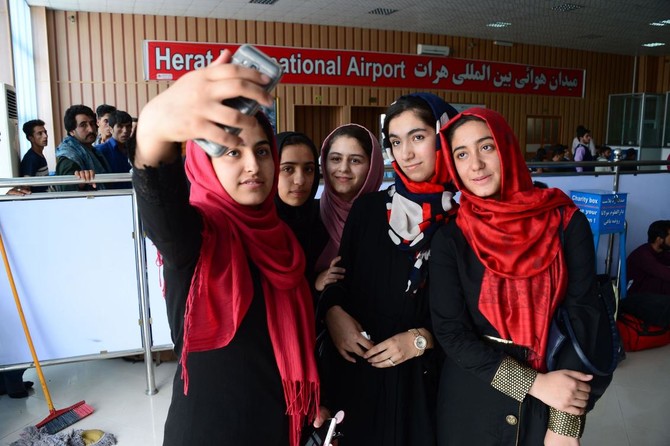
India says Canada has shared no evidence of its involvement in killing of Sikh separatist leader
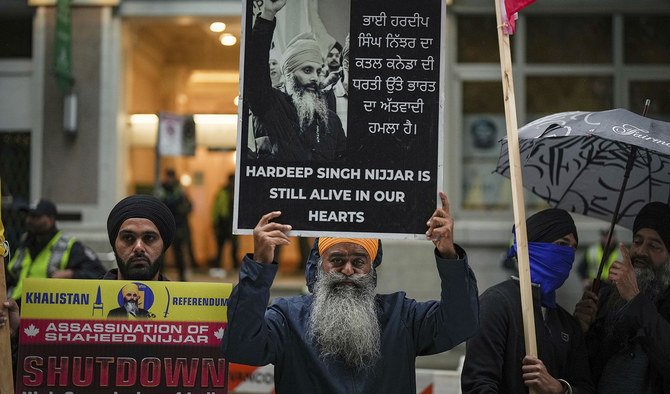
- Three Indian nationals who had been temporarily living in Canada were arrested on Tuesday in the June slaying of Hardeep Singh Nijjar
- PM Trudeau set off a diplomatic spat with India in Sept. when he cited ‘credible allegations’ of India’s involvement in the Sikh’s murder
NEW DELHI: India said Thursday that Canada has shared no evidence to back its allegation that the Indian government was involved in the slaying of a Sikh separatist leader in Canada last year, despite the recent arrests of three Indian men in the crime.
India’s External Affairs Ministry spokesman Randhir Jaiswal also reiterated India’s longstanding allegation that Canada harbors Indian extremists.
Three Indian nationals who had been living in Canada temporarily were arrested on Tuesday in the slaying last June of Hardeep Singh Nijjar in British Columbia. Canadian Prime Minister Justin Trudeau had set off a diplomatic spat with India last September when he cited “credible allegations” of India’s involvement in the slaying of the Sikh separatist. India rejected the accusations.
Canadian Mounted Police Superintendent Mandeep Mooker said after the men’s arrests that the investigation into whether they had ties to India’s government was ongoing.
Jaiswal said the two governments are discussing the case but that Canada has forwarded no specific evidence of the Indian government’s involvement.
Meanwhile, Jaiswal said New Delhi has complained to Canadian authorities that separatists, extremists and those advocating violence against India have been allowed entry and residency in Canada. “Many of our extradition requests are pending,” he said.
“Our diplomats have been threatened with impunity and obstructed in their performance of duties,” Jaiswal added. “We are having discussions at the diplomatic level on all these matters,” he said.
The three Indian men arrested in Canada haven’t yet sought any access to the Indian diplomats there, Jaiswal said.
The three — Kamalpreet Singh, 22, Karan Brar, 22, and Karanpreet Singh, 28 — appeared in court Tuesday via a video link and agreed to a trial in English. They were ordered to appear in British Columbia Provincial Court again on May 21.
They were arrested last week in Edmonton, Alberta. They have been charged with first-degree murder and conspiracy to commit murder.
Spain, Ireland to recognize Palestinian state on May 21 — EU’s Borrell
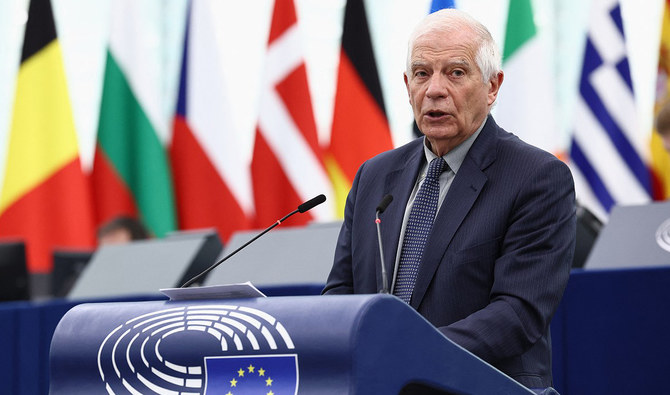
- Calls for end to Palestinian-Israeli conflict have grown along with the death toll from Israel’s war on Gaza
- Spain, others agreed to recognition of Palestinian state, seeing a two-state solution as essential for peace
MADRID: Spain, Ireland and other European Union member countries plan to recognize a Palestinian state on May 21, the EU’s foreign policy chief, Josep Borrell, said late on Thursday ahead of an expected UN vote on Friday on a Palestinian bid to become a full member.
Spanish Prime Minister Pedro Sanchez said in March that Spain and Ireland, along with Slovenia and Malta, had agreed to take the first steps toward recognition of a Palestinian state alongside Israel, seeing a two-state solution as essential for lasting peace.
Asked on local Spanish radio station RNE if May 21 was when Spain, Ireland and other EU countries would recognize a Palestinian state, Borrell said yes, mentioning Slovenia as well.
“This is a symbolic act of a political nature. More than a state, it recognizes the will for that state to exist,” he said, adding that Belgium and other countries would probably follow.
Previously, Spanish Foreign Minister Jose Manuel Albares had said the decision on recognition had been made, although he did not give a date.
International calls for a ceasefire and permanent end to Palestinian-Israeli conflict have grown along with the death toll from Israel’s offensive in Gaza to rout out Hamas after the militants’ deadly cross-border attack on Oct. 7.
Israel has said plans for Palestinian recognition constitute a “prize for terrorism” that would reduce the chances of a negotiated resolution to the Gaza conflict.
On Friday the United Nations General Assembly is set to back a Palestinian bid to become a full UN member by recognizing it as qualified to join and sending the application back to the UN Security Council to “reconsider the matter favorably.”
Ireland’s national broadcaster RTE said on Thursday that Spain, Ireland, Slovenia and Malta had been waiting for the UN vote and were considering a joint recognition on May 21.
A spokesperson for the Spanish Foreign Ministry did not immediately respond to a request for comment. There was no immediate comment on the date from the other countries.
Slovenian Prime Minister Robert Golob said earlier this week his country would recognize Palestine’s statehood by mid June.
Since 1988, 139 out of 193 UN member states have recognized Palestinian statehood.
Spain, Ireland to recognize Palestinian state on May 21 — EU’s Borrell

- Calls for end to Palestinian-Israeli conflict have grown along with the death toll from Israel’s war on Gaza
- Spain, others agreed to recognition of Palestinian state, seeing a two-state solution as essential for peace
MADRID: Spain, Ireland and other European Union member countries plan to recognize a Palestinian state on May 21, the EU’s foreign policy chief, Josep Borrell, said late on Thursday ahead of an expected UN vote on Friday on a Palestinian bid to become a full member.
Spanish Prime Minister Pedro Sanchez said in March that Spain and Ireland, along with Slovenia and Malta, had agreed to take the first steps toward recognition of a Palestinian state alongside Israel, seeing a two-state solution as essential for lasting peace.
Asked on local Spanish radio station RNE if May 21 was when Spain, Ireland and other EU countries would recognize a Palestinian state, Borrell said yes, mentioning Slovenia as well.
“This is a symbolic act of a political nature. More than a state, it recognizes the will for that state to exist,” he said, adding that Belgium and other countries would probably follow.
Previously, Spanish Foreign Minister Jose Manuel Albares had said the decision on recognition had been made, although he did not give a date.
International calls for a ceasefire and permanent end to Palestinian-Israeli conflict have grown along with the death toll from Israel’s offensive in Gaza to rout out Hamas after the militants’ deadly cross-border attack on Oct. 7.
Israel has said plans for Palestinian recognition constitute a “prize for terrorism” that would reduce the chances of a negotiated resolution to the Gaza conflict.
On Friday the United Nations General Assembly is set to back a Palestinian bid to become a full UN member by recognizing it as qualified to join and sending the application back to the UN Security Council to “reconsider the matter favorably.”
Ireland’s national broadcaster RTE said on Thursday that Spain, Ireland, Slovenia and Malta had been waiting for the UN vote and were considering a joint recognition on May 21.
A spokesperson for the Spanish Foreign Ministry did not immediately respond to a request for comment. There was no immediate comment on the date from the other countries.
Slovenian Prime Minister Robert Golob said earlier this week his country would recognize Palestine’s statehood by mid June.
Since 1988, 139 out of 193 UN member states have recognized Palestinian statehood.
Spain, Ireland to recognize Palestinian state on May 21 — EU’s Borrell
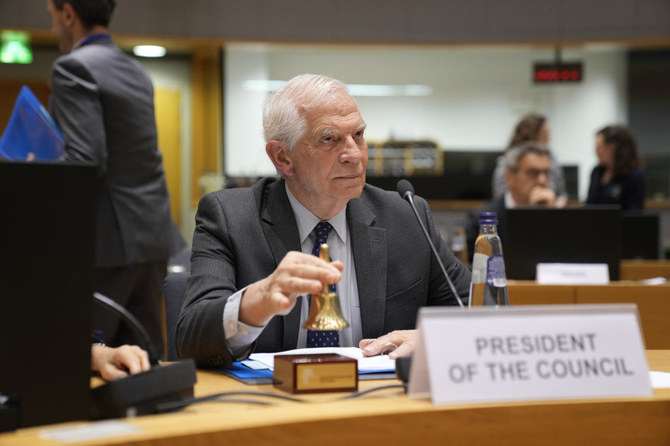
- Spain and Ireland, along with Slovenia and Malta, had agreed to take the first steps toward recognition of a Palestinian state alongside Israel
MADRID: Spain, Ireland and other European Union member countries plan to recognize a Palestinian state on May 21, the EU’s foreign policy chief, Josep Borrell, said late on Thursday ahead of an expected UN vote on Friday on a Palestinian bid to become a full member.
Spanish Prime Minister Pedro Sanchez said in March that Spain and Ireland, along with Slovenia and Malta, had agreed to take the first steps toward recognition of a Palestinian state alongside Israel, seeing a two-state solution as essential for lasting peace.
Asked on local Spanish radio station RNE if May 21 was when Spain, Ireland and other EU countries would recognize a Palestinian state, Borrell said yes, mentioning Slovenia as well.
“This is a symbolic act of a political nature. More than a state, it recognizes the will for that state to exist,” he said, adding that Belgium and other countries would probably follow.
Previously, Spanish Foreign Minister Jose Manuel Albares had said the decision on recognition had been made, although he did not give a date.
International calls for a ceasefire and permanent end to Palestinian-Israeli conflict have grown along with the death toll from Israel’s offensive in Gaza to rout out Hamas after the militants’ deadly cross-border attack on Oct. 7.
Israel has said plans for Palestinian recognition constitute a “prize for terrorism” that would reduce the chances of a negotiated resolution to the Gaza conflict.
On Friday the United Nations General Assembly is set to back a Palestinian bid to become a full UN member by recognizing it as qualified to join and sending the application back to the UN Security Council to “reconsider the matter favorably.”
Ireland’s national broadcaster RTE said on Thursday that Spain, Ireland, Slovenia and Malta had been waiting for the UN vote and were considering a joint recognition on May 21.
A spokesperson for the Spanish Foreign Ministry did not immediately respond to a request for comment. There was no immediate comment on the date from the other countries.
Slovenian Prime Minister Robert Golob said earlier this week his country would recognize Palestine’s statehood by mid June.
Since 1988, 139 out of 193 UN member states have recognized Palestinian statehood.
Putin reappoints Mishustin as Russia’s prime minister
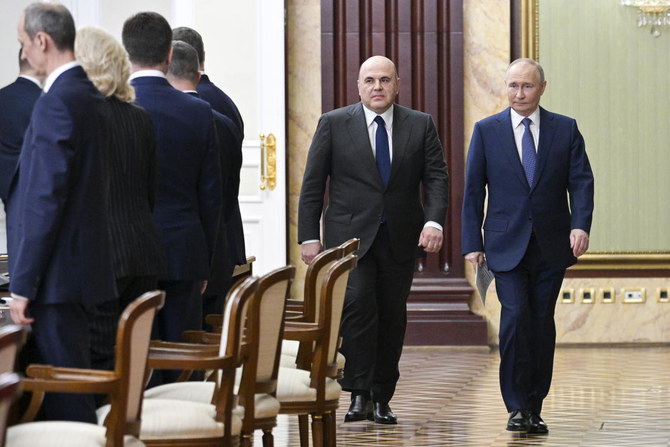
- Parliament Speaker Vyacheslav Volodin said the house, the State Duma, will hold a session later Friday to consider Mikhail Mishustin’s candidacy
MOSCOW: Russian President Vladimir Putin has reappointed Mikhail Mishustin as prime minister for the lower house’s approval.
Parliament Speaker Vyacheslav Volodin said the house, the State Duma, will hold a session later Friday to consider Mishustin’s candidacy.
Mishustin’s approval is a mere proforma in the Kremlin-controlled parliament.
In line with Russian law, Mishustin, 58, who held the job for the past four years, submitted his Cabinet’s resignation on Tuesday when Putin began his fifth presidential term at a glittering Kremlin inauguration.
Mishustin’s reappointment was widely expected by political observers, who noted that Putin values his skills and the lack of political ambition. Mishustin, the former head of Russia’s tax service, has kept a low profile, steering clear of political statements and avoiding media interviews.



